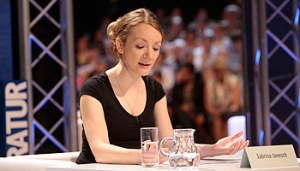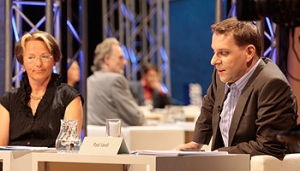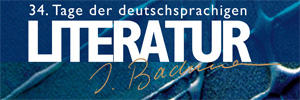 Sabrina Janesch während der Lesung (Bild: Johannes Puch)
Sabrina Janesch während der Lesung (Bild: Johannes Puch)
Sabrina Janesch (G) opened the readings
The text by Sabrina Janesch is an excerpt from her debut novel “Katzenberge” [cat mountains], which will be published in 2010. The jury did not like the text at all.
Recommended by Alain Claude Sulzer
“Katzenberge” tells the story of the relocation of Ukrainian peasants from Galicia to Silesia, who were bundled off against their will by the Russians by train into the unknown to settle in the abandoned farms of the Germans. The text was suggested by juror Alain Claude Sulzer.
Author portrait
Reading
Discussion
Winkels: “Blind spot of recent history”
The text talks about one of the “blind sports” of recent history, new juror Hubert Winkels remarked, initially with appreciation: the expulsion of the Germans after World War II. The problem: the text, whose narrative dramaturgy and composition he faulted, has to be able to cope with such a sensitive subject matter. Ultimately, the “story is harmless”, and its means originate in the “type case”.
Winkels: “If I were to be really mean, I would say it reminded me of a puppet theatre – the details show that the text is not a success”.
Reminiscent of Thomas Bernhard
In addition, Paul Jandl was reminded of Thomas Bernhard’s post-war farce “A Doda”. Unlike Bernhard, what’s worrying here is that the ghosts of the past appear so “ecologically and deliberately bred”. With this “touch of magic” he doesn’t quite feel comfortable with the setting, says Jandl.
 Sabrina Janesch (Bild: Johannes Puch)
Sabrina Janesch (Bild: Johannes Puch)
Sulzer attempted to appease
Juror Alain Claude Sulzer now attempted to appease matters and defend “the story of an ordinary man who turned simple things into something grand”. The “promise of eeriness” made at the beginning of the text is kept in the story. “What’s central”, according to Sulzer, “is that the man comes to an alien environment and everything around him is hostile”. This is “all quite conceivable”.
“Virtues turn into their opposite”
Meike Feßmann then said that precisely the virtues of the text turn into their opposite: relative to the subject matter, the rural mood is “overly instrumented”. “The granddaughter is the one who lives out the material that the grandfather talks about – and adds some more”.
“Too well-behaved”
“I don’t feel touched by this story at all”, Karin Fleischanderl started her negative criticism. For her, the text does not bring across the horror and terror of the times. She is looking for a language that’s “wilder, more brutal”, a language more suitable for the subject matter. “Too well-behaved!”
She liked the time stretching
Hildegard Elisabeth Keller then spoke in favour of the text and its successful narrative dramaturgy: “I like the time stretching of the first night very much.” Unfortunately, the individual, the grandfather, is portrayed in a rather bland kind of way by his granddaughter. “This really is a banal, crude story, the protagonist makes a cadaver habitable.”
Spinnen initially didn’t want to say anything
Jury chairman Spinnen, who initially did not want to say anything given the number of redundant remarks, finally added: “The story stands or falls depending on how successfully it managed to create a historical distance. The period of time that lies between grandfather and granddaughter would be what makes it interesting – but what we are really dealing with here is one being with two mouths, or one mouth with two heads.”
 Jury (Bild: Johannes Puch)
Jury (Bild: Johannes Puch)
“Thematically appealing”
Alain Claude Sulzer then tried to save whatever could be saved and remarked that this “thematically appealing story” has a nice flow about it. “This is no cheap horror story. We all know that the world is bad, so why should we be shaken up?
“Let’s leave it at that”, was author Sabrina Janesch’s comment on the discussion.
Barbara Johanna Frank
 TDDl 2010
TDDl 2010